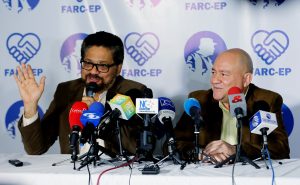Bogota, Jul 24 (EFE).- The Revolutionary Armed Forces of Colombia (FARC) guerrilla group said Monday that it planned to reorganize as a political party effective Sept. 1.
“On September 1, we will launch a new political movement,” Carlos Antonio Lozada, a member of the FARC’s military high command, told reporters in Bogota.

The new party will have its official public introduction at a rally in Bolivar Plaza in the Colombian capital, the guerrilla leader said.
FARC leaders, who are working on laying out the party’s policies and identifying candidates for future elections, are “receiving reports from the different departments of the Central Command to prepare a political platform,” Lozada said.
“We have economic proposals, our party’s policies on gender, proposals for the young people, defense of the environment and urban and farm policies,” Lozada said.
The FARC, looking ahead to next year’s general elections, must select candidates for office and candidates for the five seats in the Senate and five in the lower house of Congress awarded to the group under the 2016 peace agreements.
Ivan Marquez, who headed the FARC team that negotiated the peace deal with the government, said the former rebels’ political party would receive campaign funds like all other political movements.
Marquez expressed concern about the killings of rebels who laid down their arms, saying that “at least six former guerrillas and some relatives have lost their lives.”
“It would be sad to return in Colombia to the extermination of a political force, as happened with the Patriotic Union,” Marquez said.
In the 1980s, the FARC and the Colombian Communist Party signed agreements with the government and created a political party called the Patriotic Union (UP), which participated in elections.
Thousands of UP leaders and members were killed by right-wing paramilitary groups and the UP disappeared.
On Nov. 24, 2016, President Juan Manuel Santos and FARC Commander Rodrigo Londoño Echeverri, better known as “Timochenko,” signed a revised peace agreement that ended Colombia’s 52-year-old internal armed conflict.
They signed the pact, which modified an earlier deal inked on Sept. 26 in Cartagena, with pens made from bullet casings to symbolize Colombia’s transition from war to peace.
The pact incorporated changes sought by those who voted down the original agreement in an Oct. 2 referendum and was later ratified by Congress.
The FARC battled a succession of Colombian governments starting in 1964.
Colombia’s civil war – involving the army, the FARC and other guerrilla groups, as well as rightist paramilitaries – has claimed at least 220,000 lives and displaced millions of people.
